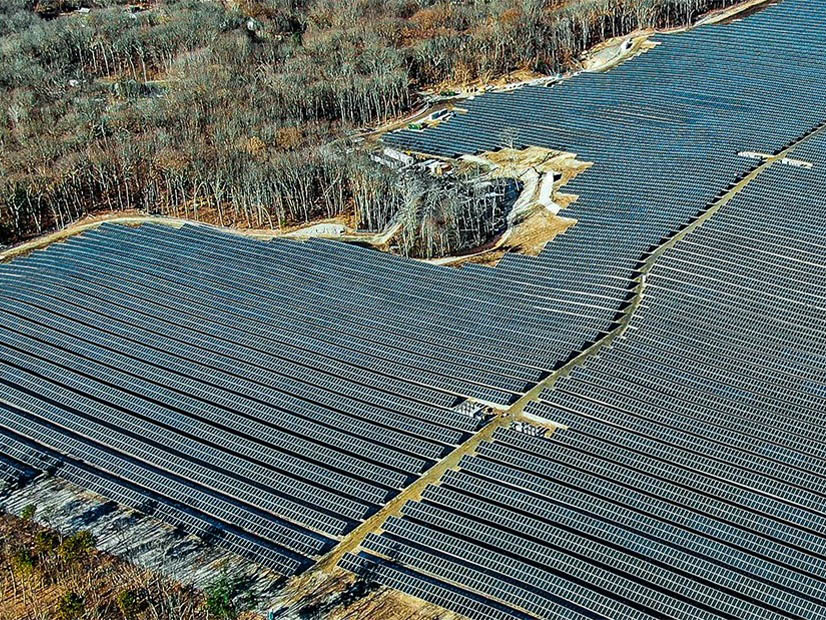
Members of the public asked Rhode Island’s climate leaders Tuesday to elevate the policies of three stalled energy-related bills as priority actions for reducing the state’s greenhouse gas emissions.
They said that the policies, which support energy storage and renewable energy deployment, should be a part of the state’s next plan for emission reductions in the electric sector.
Top among the policy priorities was a 100% renewable energy standard (RES) bill (H.7277) that was introduced in February and held for study in March by the House Environment and Natural Resources (ENR) Committee.
Passing a 100% RES by 2030 would be “really helpful,” Greg Gerritt, former executive director of the Environment Council of Rhode Island, said during the Executive Climate Change Coordinating Council (EC4) listening session. Amy Moses, general counsel for Utilidata, echoed Gerritt’s comment, saying that the standard is “critical” for the state.
EC4 hosted the electric sector-focused event as part of a series of listening sessions this year that will inform a legislatively mandated update to the state’s 2016 GHG Emissions Reduction Plan. A 2020 executive order from former Rhode Island Gov. Gina Raimondo put the state on a path to achieving 100% renewable energy, but it has yet to be codified.
Under the existing state RES, 19% of retail electricity supply must come from renewable sources this year, and the state had reached 12% of supply in 2020, according to U.S. Energy Information Administration data.
The Rhode Island Office of Energy Resources (OER) completed a 100% renewable energy study last year that recommended advancing an RES-like mechanism along with enabling actions, such as integrated grid planning, strategic energy storage deployment and regional collaboration on wholesale markets.
Gov. Dan McKee supported the RES bill in March 10 testimony for an ENR bill hearing, saying that the state needs a “largely carbon-free electric generation portfolio” to reach net-zero emissions by 2050. While the bill also received broad support from environmental groups and residents during the hearing, the Northern Rhode Island Chamber of Commerce urged the committee to gather insights from ISO-NE before adopting a mandate to accelerate renewables on the electric grid.
ENR still has the option of considering the RES bill again before the end of the session in June.
Rooftop Solar Cap
Eliminating current size requirements for solar rooftop systems should be an RES-enabling policy in the EC4’s emission-reduction plan update, according to Hank Webster, senior policy advocate and Rhode Island director at Acadia Center.
“We would like to see incentives for prioritizing rooftop solar throughout the state and removal of the cap on rooftop solar,” he said.
The House Corporations Committee took testimony March 1 on a bill (H.7333) that would remove size limitations on net-metered systems, but the committee voted to hold it for study.
In hearing testimony, the Division of Public Utilities and Carriers said the current limit ensures that a rooftop system meets on-site energy needs and protects ratepayers from the costs of “overly large systems.” National Grid also opposed the bill in its testimony, saying that net metering should not make rooftop solar a “revenue stream” for building owners.
Homeowners, however, should have the option to build larger systems that complement neighborhood-level demand or support peak grid demand, Webster said.
Energy Storage
An energy storage bill that the Corporations Committee held for study April 12 represents another priority policy that Webster says should be in the GHG plan update.
The bill (H.8026) would set an energy storage capacity goal for the state of 500 MW by 2032 and direct OER to develop programs and associated funding mechanisms to advance system deployments.
Sunrun supported the bill in hearing testimony, saying energy storage has a “critical role” to play in building a 100% zero-carbon electric grid in the state. The Public Utilities Commission, however, said a legislatively mandated storage compensation program, as proposed in the bill, could be more expensive than current market-based solutions and warrants further study.
Webster said that the 2022 GHG plan, which is due in December, should support a pathway to understanding where energy storage resources are needed across the region and where they can feed the distribution system.


